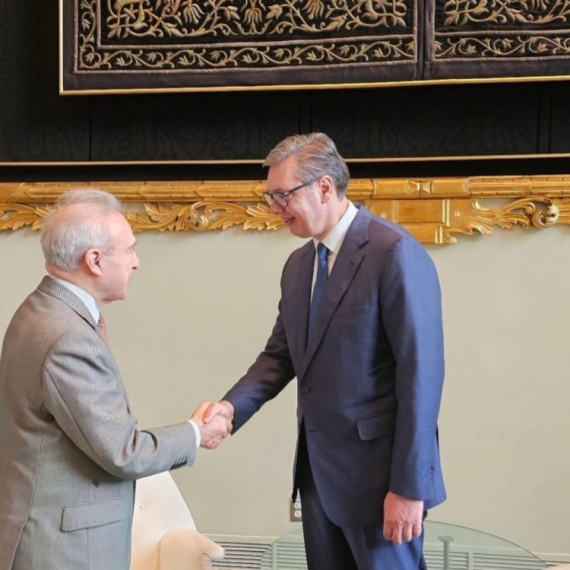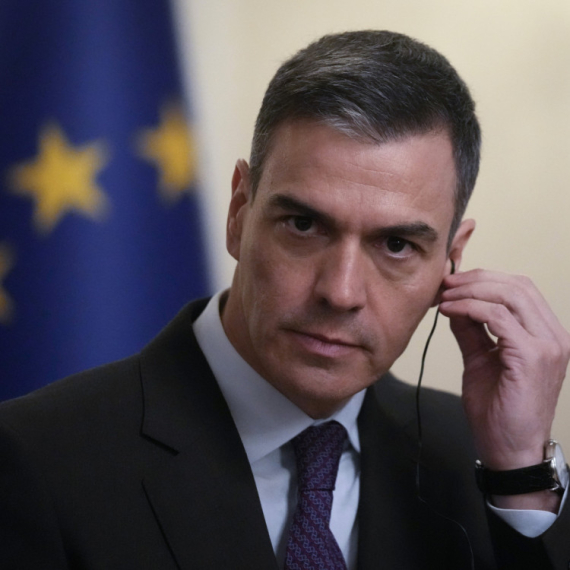UK lawmakers: EU treaty same as constitution
Parts of the Lisbon Treaty are no different from the abandoned EU Constitution, a report by British MPs has said.
Sunday, 20.01.2008.
08:38

Parts of the Lisbon Treaty are no different from the abandoned EU Constitution, a report by British MPs has said. The Commons Foreign Affairs Committee said foreign policy in the treaty was the same as in the constitution, on which Labour promised a referendum, the BBC reports. UK lawmakers: EU treaty same as constitution It also accused the government of publicly downplaying the importance of some new EU institutions and roles. Ministers argue no referendum is needed as the treaty is not constitutional. British Prime Minister Gordon Brown signed the Lisbon Treaty, as did other EU heads of state, in December. But it has to be ratified by all EU parliaments, before coming into force - something which begins in British Parliament on Monday. But ahead of the start of the process, the Commons Foreign Affairs Committee has criticized the way the government has represented the foreign policy aspects of the treaty. Its report, entitled Foreign Policy Aspects Of The Treaty Of Lisbon, claims there are only two small differences in the area of foreign policy between the treaty and the abandoned constitution. These were the addition of two non-legally binding declarations proposed by the UK and the change of the title Minister for Foreign Affairs to High Representative for Foreign Affairs and Security Policy. "We conclude that there is no material difference between the provisions on foreign affairs in the Constitutional Treaty which the government made subject to approval in a referendum and those in the Lisbon Treaty on which a referendum is being denied," the report said. It also accused the government of seeking to downplay the significance of new institutions, such as the creation of a new EU High Representative for Foreign Affairs and Security. This was "unlikely to be beneficial to the UK's position in Europe", it said, and called on ministers to acknowledge their true significance in public. The report welcomed the creation of such new roles, which it said were "major innovations in the EU's foreign policy-making machinery" which could give the EU a "more coherent development and implementation of external policy". But Mike Gapes, the committee's chairman, said MPs felt Parliament needed to have more say in the treaty's development. "Parliament has not been sufficiently involved in the negotiation and the drafting of these proposals last year," he told the BBC. "We believe that over the next few weeks [in] the Parliamentary debate we have, we need to press for greater Parliamentary accountability over the implementation and the carrying out of this treaty in practice in the coming years, if it is adopted." Brown has argued that no referendum in the UK is needed on the Lisbon Treaty because it does not have the constitutional character of the constitutional document which was rejected by French and Dutch voters at referendums in 2005. Most Conservative and some Labour MPs argue that, as the Labour government had promised a referendum on the constitution, it should do the same for the treaty which they have already said is substantially the same. But the government says it is different, and does not require a referendum. It says changes are either minor and procedural, and Britain has negotiated "opt outs" for other changes, where necessary.
UK lawmakers: EU treaty same as constitution
It also accused the government of publicly downplaying the importance of some new EU institutions and roles.Ministers argue no referendum is needed as the treaty is not constitutional.
British Prime Minister Gordon Brown signed the Lisbon Treaty, as did other EU heads of state, in December. But it has to be ratified by all EU parliaments, before coming into force - something which begins in British Parliament on Monday.
But ahead of the start of the process, the Commons Foreign Affairs Committee has criticized the way the government has represented the foreign policy aspects of the treaty.
Its report, entitled Foreign Policy Aspects Of The Treaty Of Lisbon, claims there are only two small differences in the area of foreign policy between the treaty and the abandoned constitution.
These were the addition of two non-legally binding declarations proposed by the UK and the change of the title Minister for Foreign Affairs to High Representative for Foreign Affairs and Security Policy.
"We conclude that there is no material difference between the provisions on foreign affairs in the Constitutional Treaty which the government made subject to approval in a referendum and those in the Lisbon Treaty on which a referendum is being denied," the report said.
It also accused the government of seeking to downplay the significance of new institutions, such as the creation of a new EU High Representative for Foreign Affairs and Security.
This was "unlikely to be beneficial to the UK's position in Europe", it said, and called on ministers to acknowledge their true significance in public.
The report welcomed the creation of such new roles, which it said were "major innovations in the EU's foreign policy-making machinery" which could give the EU a "more coherent development and implementation of external policy".
But Mike Gapes, the committee's chairman, said MPs felt Parliament needed to have more say in the treaty's development.
"Parliament has not been sufficiently involved in the negotiation and the drafting of these proposals last year," he told the BBC.
"We believe that over the next few weeks [in] the Parliamentary debate we have, we need to press for greater Parliamentary accountability over the implementation and the carrying out of this treaty in practice in the coming years, if it is adopted."
Brown has argued that no referendum in the UK is needed on the Lisbon Treaty because it does not have the constitutional character of the constitutional document which was rejected by French and Dutch voters at referendums in 2005.
Most Conservative and some Labour MPs argue that, as the Labour government had promised a referendum on the constitution, it should do the same for the treaty which they have already said is substantially the same.
But the government says it is different, and does not require a referendum. It says changes are either minor and procedural, and Britain has negotiated "opt outs" for other changes, where necessary.





























Komentari 2
Pogledaj komentare